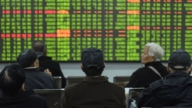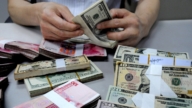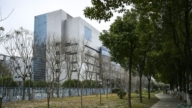【新唐人2014年07月07日讯】目前,中国房地产商因资金链断裂陷入绝境的现象,已经由二、三线城市蔓延到楼市坚挺的一线城市。日前,上海一国际广场项目因资金链断裂被迫停工,闹市区的在建工程被法院贴上了封条。业内人士指出,未来融资困难、销售不畅的中小房企,恐怕会处于更加危险的境地,而相关金融机构的风险也在积聚增加。不过这时党报发文声称,房市疲软,房价下跌对经济影响十分有限,相反将有利于中国经济结构向更高质量增长进行调整。
上海市嘉定区曹安商圈,林立着数家超大型批发商场,来往的货车络绎不绝。然而身处繁华地段的“悦合国际广场”项目,却因为开发商资金链断裂,延迟交房半年,已经停工一个月,并拖累多家金融机构深陷其中。
据大陆《中国证券报》报导,“悦合国际广场”已经被上海市闵行区人民法院,以财产保全的名义正式查封,同时也被徐汇区人民法院以执行需要的名义轮候查封。
面对全国房市一片叫惨的景象,7月2号,《人民日报》海外版发文说,房市疲软,房价下跌对经济影响十分有限,楼市步入调整期,是在经历所谓10年高增长之后的理性回归,将有利于中国经济结构向更高质量增长进行调整。
大陆经济学者邓先生:“虚张声势,把水搅浑,现在大家都看清了,把中国经济拖垮,到那时候受害最大的不是房地产商或者是老百姓,因为经济崩盘的话,那就意味着社会制序也会遭受巨大的社会动荡,这都是政府不愿意看到的。
大陆财经评论员牛刀:“中国是个专政主义国家,他是集团主义国家,在房地产发生问题的时候,央行啊!就是包括政府啊,动员一切的手段来维护这个房价,他不按市场来走,这样大家一看是政府在秘密保护泡沫,所以大家拚命冲进泡沫当中。”
据报导,“悦合国际广场”在建工程被查封的主要原因,是“悦合置业”与多家银行之间的债务纠纷。“悦合国际广场”部分在建工程的抵押权人,是浦发银行闵行支行,债权数额为2亿4000万元。另外,建设银行、宁波银行和“悦合置业”之间也存在不同形式的债权债务关系。
而位于杭州的商品房项目“田逸之星”一期,原本应该于去年年底交付,由于开发商拖欠建设工程款,工程在去年6月停工。
今年3月,宁波奉化最大房企“兴润置业”出现资金链断裂,资不抵债,总负债35亿多元。5月初,全国百强房企“光耀地产”因债务危机,濒临破产,波及到多家银行、信托和类信托计划。
北京大学光华管理学院博士生导师王建国:“真正害怕房地产下跌的还是政府。因为房地产崩盘的话,一些银行会有倒闭的风险,政府要救银行就得发钞票,发钞票又会导致通货膨胀。那么地方的地也卖不掉,那地方政府就根本没法运作,没有了土地财政,又要让社会稳定,就必需发钞票借给地方政府,这样的话又是恶性通货膨胀。”
在中国,因为地产项目陷入险境,房地产信托“踩雷”者不断增多。苏州“荣辰置业发展有限公司”发行的一款去年8月份到期的资金信托计划,在今年5月初传出,信托计划没能足金额兑付本息。
而去年11月,“新华信托”发行的山东“火炬置业有限公司”贷款集资信托计划,因为违约进入司法诉讼程序﹔同一个月,四川信托因与融资方的借款纠纷,将旗下信托计划合作方起诉。今年,“新华信托”陷入与上海“高远置业”的信托纠纷中﹔而“五矿信托”起诉上海“荣腾置业”追讨4亿元的债务。
同时,中国各地频频出现房地产商跑路现象。去年,唐山一家房地产商扔下13亿欠款跑了,害得投资者服毒自杀。今年4月,江苏无锡楼盘没有完工,开发商却已消失,数百购房人血本无归。
采访编辑/刘惠 后制/舒灿
China's State Media Cheerful on Real Estate Market Impasse
The break of capital chains has caused China's
real estate market to reach an impasse.
Now this phenomenon is spreading from small
and medium cities to big ones.
A project in Shanghai was forced to stop
and the property under construction in a busy neighborhood
was sealed up by courts.
Some professionals are saying that future financing issues
and sluggish sales will put small and medium real estate
companies into a more challenging situation.
Meanwhile, the risks faced by those financial structures that
are associated with the real estate market are escalating too.
Nonetheless, the party's state run newspaper published
an article saying that the housing market and sale price slump
won't impact China's economy too much.
State media say that, to the contrary,
it will help transform China's economy to a high-quality growth.
There are so many extra-large wholesale supermarkets
in Caoan Business Circle, Jiading District, Shanghai city.
Trucks carrying goods come one after the other.
Yet, work on the “Yue He International Square” project,
located in the busy area, was suspended a month ago
because the developer's funding chain broke.
This project will be delayed for another half a year
and quite a few financial structures were trapped in the process.
As reported by China Securities Journal,
"Yue He International Square” was officially seized
as collateral by Shanghai Minhang District People's Court,
and in turn, Xuhui District People's Court.
The housing market has been bleak across China.
The overseas edition of party mouthpiece People's Daily
published an article on July 2, saying that the bleak housing
market has very limited impact on China's economy.
It says home prices have gotten into the phase of adjustment,
which is a rational regression after 10 years of high growth,
and the changes in the housing market will help transform
China's economic structure to one of high-quality growth.
Mr. Deng, Chinese economist: “The party is making
an empty show of strength and trying to confuse the public.
Now we clearly see that if China's economy falls apart,
the hardest hit victims won't be developers or ordinary people.
If China's economy collapses, it will bring about social chaos,
which the party is unwilling to see.”
Niu Dao, China financial commentator: “China is a dictatorship.
When the real estate market is in trouble, the Central Bank
and the government will do anything to maintain housing prices.
They never follow the market.
When people realize the government is trying all means
to protect the ‘housing bubble’, they will dive into the bubble too.”
Reports say the main reason “Yu He International Square”
was sealed up is the debt entanglement
between “Yue He Properties” and banks.
The Minhang branch of Shanghai Pudong Development Bank
is one of the mortgagees of Yue He International Square
with $39 million in debt secured.
Meanwhile, China Construction Bank and Ningbo Bank also
have many forms of a debtor-creditor relationship with Yue He.
"Tian Yi Zhi Xing, a real estate project in Hangzhou,
should have been completed by the end of last year.
However, the developer defaulted on their loan,
so the project was suspended last June.
This March, Xing Run Properties, the biggest developer
in Fenghua, Ningbo, came across funding problems
and was $564 million in debt.
Guang Yao Properties, one of China's top 100
real estate companies, almost went bankrupt,
which has an impact on many banks and trust firms.
Wang Jianguo, doctoral supervisor from Guanghua School
of Management, Peking University: “It is the government
that fears most about the collapse of the real estate market.
Once the real estate market falls apart,
there are risks that some banks might go bankrupt.
If the government wants to save the banks,
more money needs to be printed, which will cause inflation.
If local governments aren't sell the land off,
they can't operate normally either.
With no income from land sales,
the central government will have to lend money
to local governments to maintain local stability.
Again, it's malignant inflation."
In China, since the real estate market is running into more
and more risks, real estate trusts have become endangered.
Suzhou-based Rong Chen Real Estate Development
issued a trust expected to have matured in August last year.
However, until this May, the trust hadn't received
the full principal and interest payments.
In November 2013, Xinhua Trust issued a loan funding
trust plan for Shangdong-based Torch Investment.
Because of a breach of contract,
it's now in judicial proceedings.
During the same month, Sichuan Trust sued its trust plan
partner because of a loan dispute with the financiers.
This year Xinhua Trust was trapped into a loan dispute
with Shanghai-based Gao Yuan Properties.
Wu Kuang Trust sued Shanghai-based Rong Teng Properties
to recover a debt of $64 million.
Quite often, developers run will away from their debts.
Last year, a developer in Tangshan disappeared,
and left behind $209 million in debt.
A lot of investors have been so desperate
that they've committed suicide by taking poison.
This April, one developer disappeared before the property
under construction was completed in Wuxi city, Jiangsu.
Hundreds of home buyers lost out.
Interview & Edit/liu Hui Post-Production/Shu Chan


























